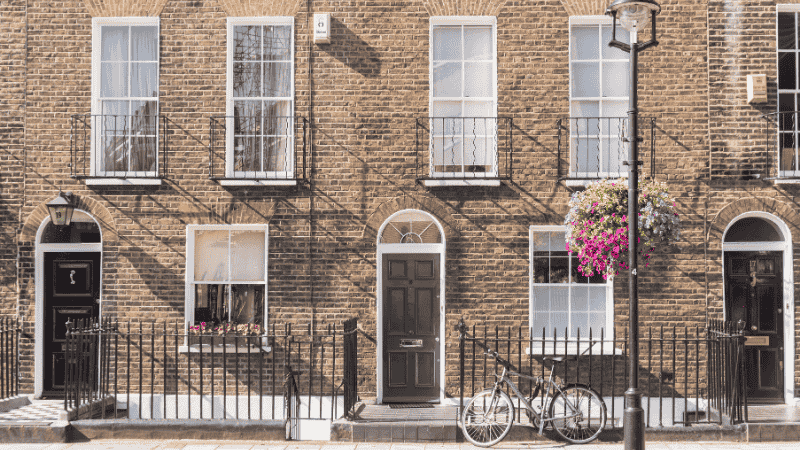Categories
How To Get Fast Property Auction Finance

Property auction finance must be quick and efficient to keep up with the fast-paced and competitive nature of property auctions.
This is why a standard mortgage usually doesn't work for auction finance. They take too long to arrange (typically a number of months), with affordability checks based on income, credit score, spending history and countless other factors.
So, what do you do when you need to complete your auction property purchase within 28 or 56 days? This is where an auction bridging loan comes in.
There are many advantages to buying a property at auction. It's a great way to get a bargain and a quicker option that allows both parties to move through the property purchase quickly.
Contracts are usually signed promptly after the deal is over, and the buyer gets to see the other offers themselves, so there is a certain level of transparency that can put the buyer at ease.
Auction properties can go for up to 10-30% lower than market price for a variety of reasons - in some cases, because the property needs significant work done, other times because the house has been possessed by the state and needs to be sold quickly.
Because of these unique advantages, auction properties are often sought after by developers or landlords who can see the potential for investment and want to 'flip' them.
If you've decided that buying a house at auction could be the right step for you, you'll need to ensure you have the right funds to outbid the competition and complete your purchase.
Is Property Auction Finance Cash-only?
You'll be relieved to know that auction properties aren't cash-only. You can use a mortgage for an auction property, provided it doesn't have any factors that would deem it unmortgageable, such as serious structural defects, rot or no kitchen or bathroom.
The problem is that most mortgages take far too long to arrange - this is where a bridging loan comes in.
Timing plays a huge role in buying a property at auction. If your bid is successful, the sale is agreed upon once the hammer falls. This can be convenient for the seller because it speeds up the process, but it doesn't give the buyer much time to raise the funds.
How soon do you have to pay for an auction property?
- You'll need to pay a 10% deposit straight away
- The remaining 90% is usually due within 28 days
Having your finances in place is crucial. If you don't find the cash by the deadline, you'll lose your deposit and any money you've spent on property surveys.
In situations like this, auction finance in the form of a bridging loan can help.
Bridging loans are designed specifically for short-term funding solutions like auction properties. Bridging finance has a much quicker turnaround than mortgages (sometimes in less than a week), making it perfect for financing an auction property.
Bridging loans can also fund refurbishment costs on top of your property purchase.

Why Use Property Auction Finance?
- If you have your eye on a great auction property, there could be many reasons why you might need help funding your purchase.
- It might not be feasible for you to spend most of your savings on an investment property. You may want to save your money for renovation costs, or you may simply not have the level of savings to purchase a property outright.
- In cases like these (and many more), it makes financial sense to take out a loan to aid your financial freedom and maximise your ROI.
While it's possible to use a mortgage to fund your auction property purchase, it's important to note that traditional mortgage loans are generally not a go-to option for auction buyers for three main reasons:
- You will have wasted the application costs if you apply for a mortgage before the auction date and don’t win the property you bid on.
- If you choose to wait until after the auction when you have won a property, the application process for a standard mortgage will take too long. This means you won’t be able to secure the money in time to complete your purchase.
- Perhaps you have no intention of living in or renting out the property but want to sell it on to make a profit. In this scenario, you simply won't need a mortgage at all.
When using a bridging loan to finance your auction property, you can borrow a similar amount to a traditional mortgage on a short term basis.
Terms tend to be more flexible, and the money can be raised much faster than a conventional mortgage, allowing you to move forward with a house purchase within the tight timeframes of an auction.
You can then repay your bridging loan as a lump sum later down the line, usually either by:
- getting a standard mortgage to replace it
- or selling (flipping) the property
Find out how we helped a recent client finance an auction property when his funding collapsed at the last minute in the video below:
How Does Property Auction Finance Work?
Short-term auction bridging loans are available from specialist lenders on a monthly interest-only basis. They're often used to pay for your auction property (and potentially do some refurbishments to increase its value).
- When you apply, you can get an offer in principle within 24 hours, and the funds could be in your bank account within 7-14 days.
- You can take out the bridging loan for up to 12 months (sometimes up to 24 months).
- Since bridging loans are short-term, interest rates are calculated on a monthly basis rather than an annual percentage rate (APR).
- You then repay the loan when you sell the property or refinance it through a residential or buy to let mortgage.
- You only pay interest on a bridge loan until the day you repay it.
Use our Auction Finance Calculator
Our auction finance calculator provides an approximate idea of what an auction bridging loan might cost you. But keep in mind that a specialist finance broker will be able to fine-tune your expected charges to your circumstances:
Auction Finance Eligibility Criteria
To qualify for property auction finance, you'll need to meet two essential criteria:
- You'll typically need to put down at least 10-20% of the loan amount. You may also be able to provide another asset or property as security. The larger your deposit, the lower the interest rates you will have to pay.
- You will need to have a solid exit strategy to repay the loan. A lender will want to know how you will repay the loan by the end of the agreed term. In most cases, this will be through selling the property or refinancing with a traditional mortgage loan.
Before an auction finance lender approves your loan, they will want to see evidence of the value of the property you are buying, either its saleability or an agreement in principle from a mortgage lender, as proof that you have a viable exit strategy in place.
Since the loan is secured against property, the lender won't consider your income. Equally, your credit history won't affect an offer as long as any outstanding debts or adverse credit doesn't impact your ability to repay the loan. However, if you do have a bad credit rating, you may have to pay higher interest rates.
Types of Property You Can Buy with Auction Finance
Auction finance can be used to buy many types of property, including:
- Residential property - to live in, let out or sell on
- Commercial property
- HMOs
- Mixed-use property
- The purchase of Land (with or without planning permission)
- Agricultural properties
- Unmortgageable properties
How to Apply for Auction Property Finance
When you've found a property you want to bid for, you'll put yourself in the best position to secure property auction finance by following these three simple steps:

Get your documents in order: You'll need evidence of your deposit and exit strategy as well as a valuation report on the property you intend to buy (or other property and assets you have as security).

Check your credit profile: Be prepared for the lender to carry out a credit check. While bad credit is not usually a significant issue as long as your exit strategy is solid, improving your credit score and having outdated information removed could boost your chances of securing a more competitive deal.

Speak to a specialist auction property finance broker: Using a specialist finance broker, such as Clifton Private Finance, can give you the best chance of securing excellent terms and rates on your loan and enable you to move quickly when the time is right.
Doing this before you go to auction can help you get valuable advice on how best to approach your purchase. Not only this, but our expert knowledge in the niche and relationships with exclusive lenders can help you get the best deal on the market.
How to Find the Best Rates on Property Auction Finance
If you need to find auction finance fast but still want to take advantage of the best rates available, we can help.
Our team of highly experienced auction finance brokers have the knowledge and experience to match your borrowing requirements and personal circumstances with the lenders offering the best deals.
We have a strong reputation for finding solutions where other brokers have failed. We work hard to get you the money you need when you need it at a rate you can afford with exceptional service.
To see what we can do for you, call us at 0117 332 5193 or book a free consultation below.


FAQs
Understanding the difference between net and gross calculations is essential when comparing deals from bridging loan lenders. The calculation determines the maximum LTV (Loan-to-Value), how much you can borrow, and how much you will eventually repay. Here’s the difference: When calculating the net loan amount for bridging loans, the borrower deducts the loan costs and additional fees (such as the arrangement fee) from the total loan amount - this is known as net loan calculation. Contrary to that, gross loan calculation is based on the loan amount the borrower can receive without deducting any costs or fees. In brief, the gross loan calculation represents the total amount available to the borrower, while the net loan represents what the borrower ultimately receives after deductions. A common complication arises when it comes to comparing bridging lenders, as different lenders advertise their bridging loan products differently. The upshot of this, is that it can become difficult to determine if a higher LTV (loan-to-value) represents the actual amount you could receive. Lenders typically use a gross loan calculation when advertising or promoting their bridging loan products. This is because the gross loan amount represents the maximum loan amount the borrower is eligible to receive, and can be used as a marketing tool to attract potential borrowers. Nevertheless, the net loan calculation is used when negotiating an agreement, which is the amount the borrower will receive after deducting fees and other costs. Borrowers are responsible for repaying this amount, and lenders will use that amount to determine repayment schedules and other loan terms. How a broker can help with bridging loan calculations A broker can assist with bridging loan calculations by providing clarity, expertise, negotiation skills, and a comparison of loan options to help you make more informed decisions. A first charge bridging loan refers to a bridging loan that is the only charge against the property, i.e., there is no existing mortgage on that property. A second charge bridging loan is when there is already a mortgage on the property that the bridging loan is being secured against. In the event of repossession, the 'first charge' has the legal right to be repaid first, before the second charge, which is why second charge loans can be slightly more expensive as they're a greater risk to lenders. It is still entirely possible to secure a second-charge bridging loan and they are common within the industry. Yes, you can get a bridging loan with bad credit. While lenders will look at your credit score and factor it into your application, there is no requirement for regular loan servicing with a bridging loan, and so your income is not analysed and your credit score is significantly less important than with a mortgage. Almost all regulated bridging loans are short-term, and have a duration of 12 months. Bridging loans are short-term by nature. However, there can be some flexibility on term length, particularly for unregulated bridging. For example, bridging for development projects, flipping properties, buy to let bridging loans and commercial bridging loans can all have longer terms up to 36 months. Some bridging loan lenders allow you to extend your term if at the end of 12 months your property hasn't sold or your alternative funding hasn't come through yet - however, this is down to the lender's discretion and there are no guarantees. It's important to be aware of the risks of bridging loans, and your property can be seized and sold to compensate for failure to repay. A bridging loan exit strategy is simply the way in which you plan to repay your bridging loan. The most common exit strategies are selling an existing property, selling the property you're purchasing, refinancing with a mortgage, or a combination. Other more unique exit strategies can include selling a business, receiving a pending inheritance, or receiving a large tax rebate. Here are some of the most common alternatives to bridging loans: We break down each of these other financing tools in our full guide to alternatives to bridging loans. While none of these options provide the flexibility, loan size and low interest rates that bridging loans do for property transactions, you may find they are more appropriate finance options for your specific situation. No, there is no strict age limit for securing a bridging loan. Bridging loans are typically 12 months in duration, which means that there aren't age limits in place like there are for mortgages that can last for 25+ years. The main example where age may be an issue is if you plan to refinance your bridging loan with a standard mortgage. In which case, you'll need to be eligible for a standard mortgage to qualify for your bridging loan - and if you are approaching retirement age, this could be an issue and you may be rejected for a bridging loan. However, we work with specialist equity release and lifetime mortgage lenders that can provide a Decision in Principle for later-life lending (if it's feasible) so that your bridging loan can be approved if it makes sense with your broader strategy. There are two types of bridging finance: regulated bridging loans and unregulated bridging loans. It simply depends on the intended use of the property you're purchasing. When you or a family member intend to live in the property you’re purchasing with your bridging loan, you’ll need a regulated bridging loan. If you're getting bridging finance on property that you or a family member will not be living in, or if it’s a commercial property, then you’ll need an unregulated bridging loan (commercial bridge loan). And if you intend to sell the property to repay your bridging loan (flipping the property) instead of refinancing or selling another property, you’ll get an unregulated bridge loan. Regulated bridging loans are authorised and regulated by the FCA and are usually locked to a 12-month maximum term. Unregulated bridging loans, meanwhile, can have extended periods of up to 36 months and are generally more flexible. If you’re unsure, it’s best to speak to a qualified adviser to go over exactly what you need and find the best bridging loan for you. Yes, your bridging loan lender will require a new valuation to be carried out for all properties in your bridging loan transaction. In some cases, we can work with lenders that can facilitate a 'desk valuation', which is a valuation carried out online based on the local property market, images of the property and the specifications of the home - this can save a considerable amount in fees and speed up your application, but it's not always possible, especially for higher value properties. You can borrow up to £25m with bridging finance, but it’s typically capped at about 80% of the value of the property you’re using as security. It's important to note that different lenders have varying policies and criteria regarding the maximum loan amounts they offer for bridging finance. Some lenders have a maximum limit of over £1 million, while others may specialize in smaller loan amounts. Additionally, the terms and conditions of the loan, including interest rates and fees, should also be taken into consideration when determining the overall affordability of the bridging loan. You don't necessarily need a deposit for a bridging loan in the traditional sense of cash reserves, but you do need security for your loan in the form of another property or asset to keep the loan-to-value below 80% at a maximum. For example, if you're buying a £300k property with a £300k bridging loan, you'd need another property to secure the loan against along with the property you're buying, or else your loan to value would be 100%. You can effectively secure a loan for 100% of a property value, but only if you have other property as security to keep your overall loan-to-value below 80%. So, if you're getting a loan for 100% of a property value, you'll need another property in the background to secure it against. The easiest way to see if you're eligible is either to give us a call or use our bridging loan calculator that automatically calculates your LTV. Using funds from a bridging loan to purchase a property puts you in a strong position as a buyer - similar to that of a cash buyer. Being a cash buyer is attractive to sellers because there is no onward chain requirement, and the funds are ready to go for the purchase. Using a bridging loan also eliminates the need for the chain to complete, and puts you in a position where funds can be available in a matter of weeks for completion; effectively rendering you a cash buyer to prospective sellers. Regulated bridging loans (for residential properties) are typically 12 months, however, some non-regulated bridging loans for buy to lets and commercial properties can be up to 36 months. Some lenders are more flexible on term durations than others, and it can be a case-by-case basis as to whether you'll get approval for a longer loan term. Yes, you can use a bridging loan to pay Stamp Duty. This amount could be covered by a bridging loan, providing you have a way to repay the additional borrowing amount to your lender. Yes, bridging loans are generally considered safe provided they are used for suitable property transactions. Speaking to a bridging loan adviser is recommended if you're unsure about the risks and suitability of a bridging loan for your situation. Generally speaking, the main risk of a bridging loan is that if you cannot repay the loan, your property can be repossessed and sold to clear your debt. For example, if you take out a bridging loan to buy a new property but your existing property fails to sell and you cannot recoup the funds, this could become a risk. However, bridging lenders always require their own valuations for any property involved in a bridging transaction to combat this. Another example could be that you're unable to secure a mortgage to refinance your bridging loan. At Clifton, we make sure your remortgage plans are sound if this is your bridging loan exit strategy, and can even arrange your mortgage for you through our dedicated mortgage advice service on the other side to smooth the process. Bridging loans are designed to be short-term so there’s no maximum age limit when applying for a bridging loan. This does depend on the lender, as some bridging lenders do have an upper age limit, but there are lenders on the market who offer bridging loans for borrowers aged 70 and over. Bridging loan interest rates usually range between 0.45% - 2% per month, depending on the case and the market rate. Unlike mortgage interest rates, bridging loan interest is calculated monthly instead of yearly. This is because bridging loans are short-term and, in many cases, repaid within a year. Bridging loans can be arranged without early repayment penalties, so interest is calculated monthly to ensure you only pay interest on the months you have the loan for. No high street banks currently offer bridging loans. Instead, bridging loans are provided by specialist short-term finance lenders. At Clifton Private Finance, we are a whole of market brokerage that deals with multiple bridging loan lenders, and we act as an intermediary between clients and the lender ensuring the process is smooth and hassle-free, and making sure our clients are getting a good deal. Banks typically charge two main fees when taking out a bridging loan – arrangement fees and interest. But there are other costs to consider such as valuation fees, broker fees and administration fees. Costs can vary from lender to lender, and will also depend on what your bridging loan is for (e.g., residential or commercial purposes.) Arrangement fees are what the lender charges you to take out the loan and can range between 1.5 - 3% of your overall loan. Bridging loan interest, on the other hand, is calculated monthly. This can catch borrowers out who may be expecting an Annual Percentage Rate (APR) like with a mortgage. You cannot turn a bridging loan into a mortgage, but you can repay a bridging loan with a mortgage and effectively refinance it into a long-term arrangement. This is common when buying an unmortgageable property with a bridging loan, carrying out refurbishments, and then mortgaging it once it is wind and water-tight and a new valuation has been carried out. This is also common for properties bought at auction where a mortgage would be too slow to arrange, and so a bridging loan is used which is then replaced with a mortgage later. Yes, bridging loans are typically more expensive than mortgages. Bridging loan interest rates can be much higher than a mortgage, and are calculated and displayed as monthly rates instead of the usual annual percentage rate (APR) that you’ll see on a mortgage. However, bridging loans are a short-term solution, and you’ll only pay interest on the months you’ve borrowed money for – and you can repay early without any charges (for most loans). There are many circumstances where bridging loans are an affordable option and a means to an end - for borrowers that need to finance a property purchase quickly, it may be the only option available. If there is a purchase involved, bridging loans are paid from the lender to the lender’s solicitor, then to the client’s solicitor, and then to the seller’s solicitor - so, you as a client will not see the funds in your own account - similar to a mortgage. If there is no purchase involved (for example, for a bridging loan for home improvements before selling), the funds go from the lender to the lender's solicitor, to the client’s solicitor, and then to the client's bank account. In terms of how bridging loans are repaid by you, they are repaid as a lump sum, either at the end of your term or during it. You can choose to either 'service' the interest, so pay the interest back monthly, or roll it up into the value of the loan to also pay this off as a lump sum along with the capital. In most cases, a bridging loan will require a minimum deposit of 25%. However, the minimum can vary depending on the lender and the specific circumstances of the loan itself. Generally, bridging loans are secured against a property or other valuable assets, and the deposit required is often expressed as a percentage of the property's value, known as the loan-to-value ratio. In some cases, 0% deposit bridging loans are an option, but only if you have other property or assets in the background to provide additional security. You do not pay monthly instalments towards the capital loan of your bridging loan. Some bridging loans require you to repay the interest accrued each month, but most lenders will actually give you the option to roll this up into the loan value, meaning you repay it with your lump sum at the end and have absolutely no monthly commitments. It's worth noting that as soon as you pay off most bridging loans, you stop accruing interest - so, the quicker you pay it off, the less expensive it will be, and there are typically no ERCs (early repayment charges). Bridging loans can be arranged in as little as 7 working days. However, it depends on the complexity of the bridge loan and your specific circumstances. It may also be more expensive for you to rush an urgent application through – but not impossible. Bridging loans are a popular option for borrowers who are under time constraints, such as buying a property at auction or breaking a chain. The key factors lenders tend to consider are: Security - Bridging finance is usually secured against property or other valuable assets. Lenders will assess the value and marketability of your security. Exit Strategy - Lenders will want to understand how you plan to repay your bridging loan. In most cases, this is selling your old property, selling the new property (flipping), or refinancing with a long-term mortgage. Loan-to-Value (LTV) Ratio - Lenders consider the loan amount compared to the value of the property being used as security as a percentage. The LTV ratio can vary, but most lenders will have a maximum of 60-80% LTV. Remember, the criteria for obtaining bridging finance in the UK can vary depending on the lender and your circumstances.
What are net vs gross bridging loan calculations?
Which calculation do lenders use for bridging loans?
What is the difference between first-charge and second-charge bridging loans?
Can you get a bridging loan with bad credit?
How short-term are bridging loans?
What are bridging loan exit strategies?
What are some alternatives to bridging loans?
Is there an age limit on bridging loans?
Are bridging loans regulated?
Do you need a valuation for a bridging loan?
How much can you borrow with bridging finance?
Do you need a deposit for a bridging loan?
Can I get 100% bridging finance?
Does a bridging loan make you a cash buyer?
What is the longest bridging loan term?
Can I use a bridging loan to pay stamp duty?
Are bridging loans safe?
Can an 80 year old get a bridging loan?
What is the monthly interest rate on a bridging loan?
Do banks still do bridging loans?
How much do banks charge for bridging loans?
Can you turn a bridging loan into a mortgage?
Is a bridging loan more expensive than a mortgage?
How are bridging loans paid?
What is the minimum deposit for a bridging loan?
Do you pay monthly payments on a bridging loan?
How long does it take for a bridging loan to come through?
What is the criteria for bridging finance?











